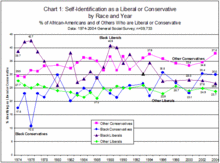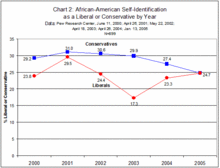In reading Erin Aubry Kaplan's op-ed on black conservatives, which Eugene Volokh dissected, I was struck not only by the argumentation that so disgusted Eugene, but also by the level of ignorance about just how common African American conservatives are.
Last year I was working on an article or chapter on the subject. While in the last decade black conservatives are very common, roughly as common as black liberals, black Republicans are relatively few in number. My discussion started with an analysis of General Social Survey data:
Except for a brief period in the early and mid-1980s, from 1974 through 1994, more African-Americans identified as liberal (35.1%) than identified as conservative (23.0%). Then in the last five GSSs (from 1996 through 2004), there has been no significant difference in self-identification: 27.6% of African-Americans identified as conservative, compared to a virtually identical 27.7% identifying as liberals. In the most recent 2004 GSS, there was also no significant difference (30.0% conservative v. 26.8% liberal). Thus, for about two decades there were more black liberals than conservatives, but according to the GSS, for about the last decade there were roughly as many of each.
(click to enlarge} Lest one think that the level of black conservatives in the GSS data is so high that it is an artifact of the database used, I examined data from six surveys from Pew Research Center, one from each year 2000-2005 (Chart 2). Overall in these six Pew Surveys, 28.8% of African-Americans identified as conservative, while only 23.4% of African-Americans identified as liberal. In none of these six individual surveys are the differences between black liberals and black conservatives significant. Yet combining the data from all six Pew surveys together, significantly more African-Americans identify as conservatives (28.8%) than identify as liberals (23.4%). In the most recent Pew Survey with released data [at the time I did this analysis] (the January 13, 2005 survey), however, the numbers of black conservatives (24.74%) and black liberals (24.70%) are virtually identical.
(click to enlarge} In one last check, I examined the 2002 and 2004 American National Election Studies (pre-election surveys), the most recently released years of ANES data. The ANES initially asks an ideology question in a way to encourage nonresponse: in 2002 of the 93 African-Americans placing themselves on a 7-point liberal/moderate/conservative scale, 42.4% identified as liberals and 33.0% identified as conservatives, a statistically insignificant difference. When asked if they had to choose would they choose liberal or conservative, again the differences in ideology were insignificant. Of the 146 African-Americans answering the question, there were no significant differences: 48.4% identified as liberal and 44.0% identified as conservative.
The 2004 ANES also shows no significant differences, but reverses the pattern in point estimates: in 2004 of the 106 African-Americans initially indicating their ideology, 20.9%% identify as liberals and 27.2% identify as conservatives, a statistically insignificant difference. When asked if they had to choose would they choose liberal or conservative, of the 184 African-Americans answering the question, there were no significant differences: 37.9% identified as liberal and 47.6% identified as conservative.
Thus in recent years, roughly equal numbers of African-Americans have identified as conservative as liberal. Of the five most recent General Social Surveys (1996-2004), six Pew Research Center studies (2000-2005), and the two most recent National Election Studies (2002 and 2004), none by itself reported statistically significant differences in the proportions of African-American conservatives and liberals. In these thirteen studies, ten reported insignificantly more black conservatives and three reported insignificantly more black liberals. If one combines these GSS studies together and these ANES studies together, still neither group is statistically significant. If one combines the Pew studies together, however, the differences are statistically significant and the direction of the effect is contrary to the stereotype: there are significantly more black conservatives than black liberals in the six Pew studies. One might also note that in the most recent studies released by the GSS (2004), ANES (2004), and Pew (January 13, 2005), there is not the slightest hint that black liberals are more numerous because all very slightly and insignificantly find more black conservatives.
I omit my discussion of unmeasured sources of likely error, but chiefly they are: (1) conservatives are more likely to be home to be surveyed, and (2) there are strong disincentives for black conservatives to self-report as conservatives (as the LA Times op-ed unintentionally illustrates).
Returning to the Erin Aubrey Kaplan's op-ed, it would be hard to be as wrong as the author is about the facts. Kaplan depicts black conservatives as both rare and exceptionally loyal, when the opposite is true: black conservatives are very common, but are far from loyal to the Republican Party; indeed, most self-identified black conservatives are Democrats.
UPDATE: In response to a comment about the views of black conservatives on particular issues, here is a link to a simple table I prepared reporting 1996-2004 General Social Survey data. The table details black conservative views on several issues: party identification (PARTYID), two abortion questions (ABNOMORE, ABDEFECT), requiring permits to own a gun (GUNLAW), affirmative action (racial preferences in hiring and promotion, AFFRMACT), premarital sex (PREMARSX), big government (HELPNOT), availability of birth control for teenagers aged 14-16 without parental consent (PILLOK), and prayer in public schools (PRAYER).
Black conservatives tend to be social conservatives, not economic conservatives. For example, consider an issue not in the table of data: the morality of gay and lesbian sex. In the 1996-2004 surveys combined, 76% of black conservatives think that gay sex is "always wrong," compared to 72% of other blacks, 72% of nonblack conservatives, and 48% of nonblack nonconservatives.
In general, however, African American conservatives seem to be somewhat more like other African-Americans than like other conservatives, but things vary a lot depending on the issue. Indeed, 57% of African American conservatives report being Democrats, compared to only 10% who view themselves as Republicans. Another 4% of black conservatives are independents who lean Republican.
Those interested in the wording of GSS questions may search the Codebook at the ICPSR site.
Related Posts (on one page):
- Why Would Blacks Become Republican?,
- Dispelling Ignorance About African American Conservatives.--
- Why Did He Steal? Well, Partly Because He's Black:

